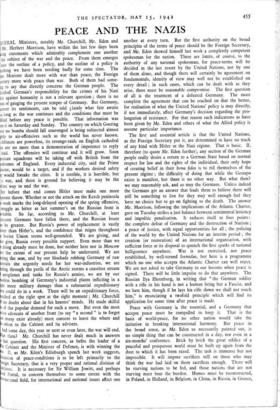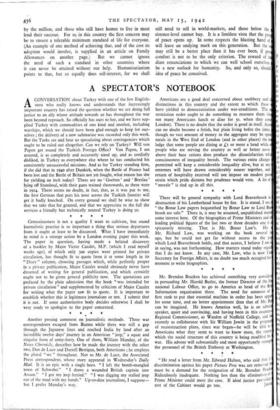PEACE AND THE NAZIS
EVERAL Ministers, notably Mr. Churchill, Mr. Eden and Mr. Herbert Morrison, have within the last few days been rig statements which admirably complement one another the subject of the war and the peace. From them emerges least the outline of a policy, and the outline of a policy is eating we have been needing badly for some time. The
Oa,
e Minister dealt more with war than peace, the Foreign tretary more with peace than war. Both of them had some- Log to say that directly concerns the German people. The lividual German's responsibility for the crimes of his Nazi lers against humanity is not a relevant question ; there is no oils of gauging the present temper of Germany. But Germany, utever its sentiments, can be told plainly what fate awaits as long as the war continues and the conditions that must be Bed before any peace is possible. That information was ten it on Saturday and Sunday. The country on which Goering lore no bombs should fall unavenged is being subjected almost ;lady to air-offensives such as the world has never known. Idefences are powerless, its revenge-raids on English cathedral bes are no more than a demonstration of impotence to reply kind. The offensive will continue and it will grow. Soon erican squadrons will be taking off with British from the odromes of England. Every industrial city, said the Prime ter, would be a target, and if the workers desired safety would forsake the cities. It is terrible, it is horrible, but is war, and there is ground for believing it may be the test way to end the war.
But before that end comes Hitler must make one more .perate throw. Whether or not the attack on the Kerch peninsula • week marks the long-delayed opening of the spring Offensive, struggle as bitter as last summer's on the Russian front is 'liable. So far, according to Mr. Churchill, at least ,000 Germans have fallen there, and the Russian losses v be greater. But Russia's power of replacement is vastly ter than Hitler's, and the confidence that reigns throughout le Soviet Union seems well-grounded. We are giving, and last give, Russia every possible support. Even more than we re doing already must be done, but neither here nor in Moscow [list the extent of our present help be underrated. We are !Ting the seas, and by our blockade robbing Germany of raw nterials she urgently needs for her war-industries, we are coding through the perils of the Arctic storms a ceaseless stream I aeroplanes and tanks for Russia's armies, we are by our Iseless bombing of Germany's industrial plants inflicting in a fight more military damage than a substantial expeditionary te could do in a week. There will be an expeditionary force, Pinched at the right spot at the right moment ; Mr. Churchill iz no doubt about that in his hearers' minds. He made skilful le of the popular demand for such a move. But even the most stive advocate of another front (to say " a second " is to forget ow many exist already) must consent to leave the where and le when to the Cabinet and its advisers.
And some day, this year or next or even later, the war will end. That then? Mr. Churchill has never dealt much in answers ) that question. His first concern, as befits the leader of a hr Cabinet and the Minister of Defence, is with winning the Ir • If, as Mr. Eden's Edinburgh speech last week suggests, Iscussion of peace-conditions is to be left primarily to the °feign Secretary, that is a very proper and rational division of inctions. It is necessary for Sir William Jowitt, and perhaps Ord Portal, to concern themselves to some extent with the tlernauonal field, for international and national issues affect one another at every turn. But the first authority on the broad principles of the terms of peace should be the Foreign Secretary, and Mr. Eden showed himself last week a completely competent spokesman for the nation. There are limits, of course, to the authority of any national spokesman, for peace-terms will be decided in the last resort by the United Nations, not by one of them alone, and though there will certainly be agreement on fundamentals, identity of view may well not be established on every detail ; in such cases, which can be dealt with as they arise, there must be reasonable compromise. The first question of all is the treatment of a defeated Germany. The more complete the agreement that can be reached on that the better, for realisation of what the United Nations' policy is may directly, if not immediately, affect Germany's decision regarding the pro- longation of resistance. For that reason such indications as have been given by Mr. Eden and others of what the Allied policy is assume particular importance.
The first and essential article is that the United Nations, as the Foreign Secretary put it, are determined to have no truck of any kind with Hitler or the Nazi regime. That is basic. If, therefore (to quote Mr. Eden further), any section of the German people really desire a return to a German State based on normal respect for law and the rights of the individual, their only hope of creating belief in their bona fides is to rid themselves of the present regime ; the difficulty of doing that while the Gestapo exists is manifest, but there is no other way. But what then? we may reasonably ask, and so may the Germans. Unless indeed the Germans get an answer that leads them to believe there will still be something to live for they may well enough feel they have no choice but to go on fighting to the death. The answer Mr. Morrison, following the implications of the Atlantic Charter, gave on Tuesday strikes a just balance between sentimental leniency and impolitic penalisation. It reduces itself to four points : the complete defeat of Germany and the destruction of Nazism ; a peace of justice, with equal opportunities for all ; the policing of the world by the United Nations for an interim period ; the creation (or restoration) of an international organisation, with sufficient force at its disposal to quench the first sparks of national belligerence anywhere. War is not exorcised, nor peace established, by well-turned formulas, but here is a programme which no one who accepts the Atlantic Charter can well reject. We are not asked to take Germany to our bosoms when peace is signed. There will be little impulse to do that anywhere. The Russian llya Ehrenburg, in writing that " the German soldier with a rifle in his hand is not a human being but a Fascist, and we hate him, though if he lays his rifle down we shall not touch him," is enunciating a twofold principle which will find its application for some time after peace is made.
Peace with Germany is the essential, and a Germany that accepts peace must be compelled to keep it. That is the basis of world-peace, for no other nation would take the initiative in breaking international harmony. But peace in the broad sense, as Mr. Eden so necessarily pointed out, is no simple thing that can be constructed in a day, nor even in a six-months' conference. Brick by brick the great edifice of a peaceful and prosperous world must be built up again from the dust to which it has been razed. The task is immense but not impossible. It will impose sacrifices still on those who may think the war had laid on them sacrifices enough. There will be starving nations to be fed, and those nations that arc not starving must bear the burden. Homes must be reconstructed, in Poland. in Holland, in Belgium, in China, in Russia, in Greece, by the million, and those who still have homes to live in must lend their succour. For us in this country the first concern may be to ensure a tolerable minimum standard of life for everyone. (An example of one method of achieving that, and of the cost its adoption would involve, is supplied in an article on Family Allowances on another page.) But we cannot ignore the need of such a standard in other countries where it can never be attained without our help. Humanitarianism points to that, but so equally does self-interest, for we shall still need to sell in world-markets, and those below the sistence-level cannot buy. It is a limitless vista that the pr of peace opens up. In some respects the blasting hand of will leave an undying mark on this generation. But the may still be a better place than it has ever been, if per comfort is not to be the only criterion. The reward of ' diate renunciations to which we can well ' school ourselves be a new outlook for humanity. So, and only so, should idea of peace be conceived.



























 Previous page
Previous page